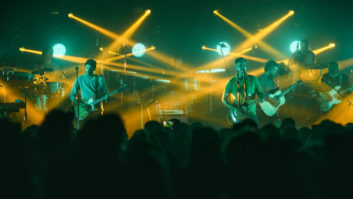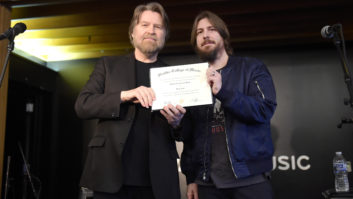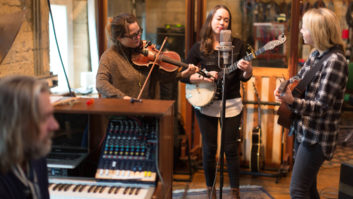Gillian Welch has carved a very interesting niche for herself. Over the course of three superb albums, the L.A.-bred but Nashville-based singer/songwriter has proven to be adept at penning new songs that sound like traditional folk, country and bluegrass tunes from the first half of the 20th century. Yet, she has also developed a distinctive songwriting voice that is at once confessional, impressionistic and highly original. The ghosts of Mississippi John Hurt, Hank Williams, the Stanley Brothers, and many other famous and forgotten musicians from America’s past drift through Welch’s songs like fond friends passing through town. Her latest CD, Time (The Revelator), the first record she and her partner David Rawlings have put out on their own Acony Records label, relies a bit less on older styles; it’s a more modern and original vision from beginning to end, though certainly there are still the voices of the past ringing through the material. Welch has developed a large and devoted following over the past several years, with each of her first two albums selling more than 100,000 copies — a huge number for acoustic country music — and her new one selling faster than the first two so far. Her visibility has increased, too, by her presence on a few cuts of the double-Platinum O Brother, Where Art Thou soundtrack, which has suddenly made traditional country music “hot” again.
The O Brother soundtrack was produced by T-Bone Burnett, who also produced Welch’s first two albums. For Time (The Revelator), however, Welch and Rawlings opted to produce themselves for the first time, cutting the album entirely live, with no overdubs, in Nashville’s historic RCA Studio B, site of legendary sessions by everyone from the Everly Brothers to Elvis to Willie Nelson. “We worked with T-Bone on and off for six years,” Welch says, “and when you work so much with somebody, you start to see things through their eyes and hear things the way they hear things. Which was helpful, actually. We had that leg up. But in a way, I think so highly of T-Bone’s abilities that part of what was going on this time around was it was time for me to assess what I could do without him. It’s good to see if you can stand on your own two feet and then manage to walk. Was it scary? Absolutely. I’ve never made a record without T-Bone. I didn’t know if we’d be able to play and then assess a good performance. There’s a big difference between one outside party and none. This was all David and me.
“That thread of self-sufficiency and independence is part of the theme of the album,” she continues. “There was no outside finance. We played on it, we produced it, we paid for it. And if, for some reason, we’d been unable to complete it, or if we’d put it out and no one had bought it, I’d be bankrupt. Not to be overly melodramatic about it, but I basically pawned the farm.”
Welch says it had long been a dream of hers to record in Studio B, adding, “When you’re in there, you can see how that room shaped the history of country music. All those great songs…and it even still has the piano that shaped country music — the piano that every song cut in there was arranged on, where the singers found their part, where Floyd Cramer invented country piano. I learned a lot about country music working in that room. It opened up all the records that were cut in there for me. Now when I hear those records on the radio, I hear that room.”
These days, Studio B is both a museum for tourists and a space-for-hire, where groups can bring in their own equipment and put it alongside the ancient gear that is part of the exhibit. “That room wouldn’t work for everybody,” Welch comments. “There’s no isolation; it’s very old-school. And it does not react well to high volume levels, so it might not work that well for some bands. But it’s very nice for vocals. It responds very well to major keys. Something very interesting happens to the overtones.”
Time (The Revelator) was recorded by Matt Andrews, using vintage mics through a Neve BCM 10 broadcast console, with its 1073 preamps, to 2-inch 16-track. “We used Dave’s and Gill’s gear,” Andrews says. “The basic setup for most of the record was a pair of M-49s as vocal mics on the two of them and then a Neumann 582 on Gillian’s guitar and a Sony C-37 on Dave’s guitar. Then we did some stuff on one mic — an old Altec dynamic. We also did a couple of things with just the Altec and just the U47. There was one that we used all dynamics, some 57s and a 58 and a Beta 57. But six or seven were the basic four-mic setup.
“We’d have to tear down every once in a while, because they had tours going through and we didn’t want people wandering into our stuff. People were there posing for pictures and leaning across microphones, so we decided pretty early we’d just tear down. One track was recorded while people were getting a tour.”
In all, the album was recorded and mixed in a little more than a month. “It was a very simple record in a lot of ways,” Andrews says. “They’d work up a song in their living room and then come over to the studio and we record it, with the two of them facing each other. Everything was live, no overdubs, and some of the songs on there are first and second takes. Having it just be the three of us made it a little easier, I think. We all knew what we were going for with this album.”
And now, it’s a part of Studio B’s bright new history.






